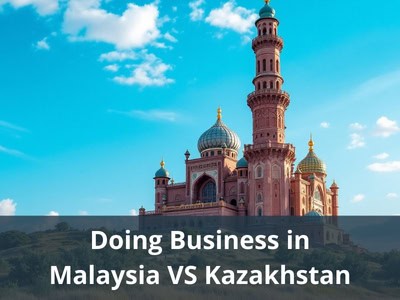Ready to Expand into India? Choose 3E Accounting Today!
Stay Secure, Stay Successful With 3E Accounting Services

This comparison helps you evaluate both countries based on incorporation ease, tax policies, market access, and business operating costs—key factors for any international expansion.
Here’s a quick overview of the key differences for easy reference.
| Factors | Malaysia | Kazakhstan |
|---|---|---|
| Business Environment | Stable, digital-ready, investment-friendly | Resource-rich, reforming regulations, regional hub |
| Corporate Tax Rate | 24% | 20% |
| Capital Gains Tax | Generally not applicable | Applicable, with some exemptions |
| Ease of Incorporation | Digital, fast via company setup in Malaysia | Simplified for locals; more complex for foreigners |
| Business Costs | Low operating and living costs | Moderate, with variable logistics costs |
| Market Access | ASEAN, CPTPP, RCEP, global FTAs | EAEU, China-Europe trade corridor |

Selecting the right partner is crucial when it comes to starting a business in Malaysia. At 3E Accounting, we offer a comprehensive range of solutions designed to simplify the entire process of company incorporation in Malaysia. From ensuring compliance with local regulations to providing expert guidance tailored to your specific needs, we make the journey seamless.
For entrepreneurs looking to navigate Malaysia company registration or explore company setup in Malaysia, our team provides unmatched expertise and support. Additionally, our company incorporation services are tailored to help you succeed in the competitive business environment.
With a deep understanding of the region’s business landscape, we also provide resources for setting up businesses in Malaysia, ensuring that every step is clear and efficient. Whether you need assistance with corporate secretarial or company secretary services, we are here to help.
To explore our services or discuss your business needs, contact 3E Accounting. With our strong presence in Malaysia and a proven track record, we are your trusted partner for success in Asia.
Stay Secure, Stay Successful With 3E Accounting Services
Answer: Yes, starting a business in Malaysia is generally easier due to its stable political climate, digital processes, and government-backed incentives.
Answer: Malaysia company registration is fast and fully online through the Companies Commission of Malaysia (SSM), while Kazakhstan’s process may require translation and manual documentation for foreign investors.
Answer: Kazakhstan has a slightly lower corporate tax rate at 20%, while Malaysia’s rate is 24%, but Malaysia offers more exemptions and no capital gains tax in most cases.
Answer: Company incorporation services by 3E Accounting provide expert support, digital processing, and full compliance assistance.
Answer: Yes, Malaysia generally offers lower business costs across office rental, labor, and utilities. You can explore more in this guide to setting up businesses in Malaysia.
Answer: Malaysia is a member of ASEAN, CPTPP, and RCEP, providing wider trade opportunities than Kazakhstan, which primarily connects through the Eurasian Economic Union.
Answer: Yes, company setup in Malaysia is fully supported by expert firms like 3E Accounting, offering end-to-end assistance for local and foreign investors.
Answer: You can contact 3E Accounting for comprehensive corporate secretarial and company secretary services that ensure full statutory compliance.
Abigail Yu
Author
Abigail Yu oversees executive leadership at 3E Accounting Group, leading operations, IT solutions, public relations, and digital marketing to drive business success. She holds an honors degree in Communication and New Media from the National University of Singapore and is highly skilled in crisis management, financial communication, and corporate communications.

